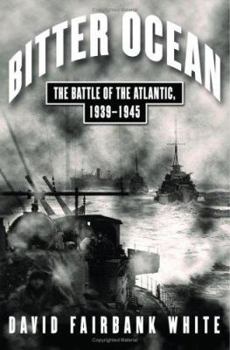Bitter Ocean: The Battle of the Atlantic, 1939-1945
Select Format
Select Condition 
Book Overview
Bitter Ocean is a masterful, authoritative account of perhaps the least-known major battle of World War II, the Battle of the Atlantic. British, Canadian, and American air and sea forces fought the... This description may be from another edition of this product.
Format:Hardcover
Language:English
ISBN:0743229290
ISBN13:9780743229296
Release Date:May 2006
Publisher:Simon & Schuster
Length:350 Pages
Weight:1.31 lbs.
Dimensions:1.3" x 6.4" x 9.4"
Customer Reviews
5 ratings
Detailed.
Published by Thriftbooks.com User , 17 years ago
Most people will not know he's the son. Although the picture demonstrates amazing similarity to someone of my generation. This is a 'must' book for WW II nuts like me. However, I don't think he gives enough credit to Enigma. However, it is refreshing to have someone explain that they read our codes too.
Bringing history alive
Published by Thriftbooks.com User , 18 years ago
David White has written an extraordinary history of the Battle of the Atlantic. He recreates the important human drama that unfolded as America, Britain and their allies performed heroic seagoing feats in order toopen the sea lanes of the Atlantic so that Europe would not be choked off from supplies and American troops could be effetively moved to the battlefields. Very well researched.
Reads like an enthralling novel...tense...suspenseful
Published by Thriftbooks.com User , 18 years ago
The Battle of the Atlantic, 1939-1945, was fought across 32 million square miles of the pitching heaving, Atlantic Ocean, in the frigid, green wastes up by Iceland, in the empty waters off the Azores, and in the gray, quick approaches to the English coast. This epic struggle saw lone, knifelike German U-boats surface in the pit of night on heaving seas to set, aim, and slam torpedoes into aging merchant ships; it saw wolfpacks of ten or more U-boats maul convoys of forty or fifty merchant ships in desperate battles that stretched over three or four days. As the war progressed, the Germans developed advanced, futuristic Type XXI U-boats which could race along underwater at phenomenal speeds. Hitler's ambitious bid was to win the war on the Atlantic with his U-boats, long, tapered, bristling with guns. "The battle, it was not really a battle but a struggle that lasted the entire war," writes White, "was a six-year effort of fundamental importance to every other engagement of World War II. On this battle hinged the efforts to bring massive convoys of merchant ships across the Atlantic, carrying the provisions, food, raw materials, and oil to keep solitary England alive during the years she stood alone against the Germans until 1941, and later every tank, gun, tent, helmet, bomb, all the troops, gasoline, coffee, wheat, rations to feed, fuel to supply the Allied armies sprawled across Europe. Without the men and ordinance on the ships, no battle, on any front, in any country overseas could be fought. The Battle of the Atlantic was the confrontation upon which the rest of World War II depended." British Prime Minister Winston Churchill spoke words to the same effect, namely, that the Battle of the Atlantic was the dominating factor all through the war. "Never for one moment," said Churchill, "could we forget that everything happening on land, sea and in the air depended ultimately on its outcome and amid all other causes, we viewed its changing fortunes day by day with hope and apprehension." In short, the strategy of the war in Europe rested on the war at sea. In the worst year of the war, 1942, U-boats bagged a total of 1,006 Allied merchant ships. The Germans were sinking Allied shipping faster than the ships could be replaced. The situation was grim; the lifeline between the United States and England was in danger of being severed. Hampered by American isolationist sentiment, President Franklin Delano Roosevelt was unable to come directly to England's aid. He did, however, sign the "Lend-Lease Act," whereby America, "the Arsenal of Democracy," supplied much-needed food, fuel, and weapons to England. On Dec. 7, 1941, the "sleeping giant" was awakened by the Japanese attack on Pearl Harbor. Soon, the industrial might of the United States swung into high gear, producing armaments for a two-ocean war, in the Atlantic and in the Pacific. Eventually, the Allies were building ships faster than the U-boats could sink them. Radar and sonar wer
Unputdownable
Published by Thriftbooks.com User , 18 years ago
Took "Bitter Ocean" out of its package and read it straight through. Unputdownable. Puts the reader alternatively at the helm of Nazi U-boats torpedoing Allied convoys, on the ships under attack, and in the cockpit of sub killing Sunderlands and Catalinas. Combines the technical clarity of Tom Clancy with the vivid style of Capote's In Cold Blood, while weaving in the political and social currents of the day in the UK and US and illuminating brilliantly the strategic importance of the Battle of the Atlantic. First rate.
Must read!
Published by Thriftbooks.com User , 18 years ago
No WWII buff, no naval history aficionado should miss this superb and exciting history of the battle for the Atlantic. As riveting and intimate as Walter Lord's "A Night to Remember," "Bitter Ocean" places you on the bridge of merchantships hunted by wolfpacks and in the CIC of German U-boats as they hunt down their prey. Don't miss this excellent history.





